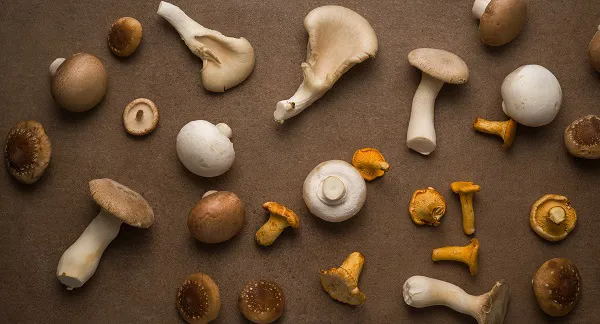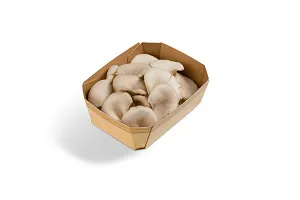In recent weeks, partial to total failures of brown mushroom crops have occurred throughout Europe. The producer organization Pilzland Vertriebs Ltd is less affected by this, but managing director Christian Nacke knows of some farms in Europe that are struggling with this. "Overall, the availability of goods seems to be very tight due to low productivity. This became very clear in the last few weeks. If it's really because there are problems at the preliminary stages of production, as a producer you are also more or less at the mercy of this situation."
Johannes Lücker, Christian Nacke, Karina Zielke, Birgit Neumann, Dirk Feldhaus and Jürgen Lange from Pilzland Vertriebs Ltd at Fruit Logistica 2023.
Limited promotional business
"Promotional business, which would usually have been done with products such as cucumbers, tomatoes and peppers, is difficult due to the general market situation for fruit and vegetables. Once these commodities become scarce, people usually resort to items like mushrooms, which are usually always available. However, if one of the main varieties, such as the brown mushroom, weakens in productivity, this has a corresponding effect on the entire fruit and vegetable sector," Nacke notes.
Cultivated mushrooms benefit from nutritional trends
King Trumpet mushrooms, oyster mushrooms and shiitake, however, did not exhibit such complications. "In the case of cultivated edible mushrooms, it is evident that we have been able to benefit greatly from nutritional trends. We have seen an annual market growth of two to three percent over the past decade. At pandemic time, consumption increased even further. It was only last year that we noticed a downward trend. However, it will certainly return to positive territory in the medium term. Mushrooms are, after all, also very popular as a meat substitute product."
The company can offer oyster mushrooms all year round. In this regard, he said, the company cooperates with a producer in northern Germany and another in Poland, both of which produce oyster mushrooms exclusively. "We are thus also in a position to adequately represent promotional deals and fluctuating quantities. Oyster mushrooms will still experience further growth, especially in the meat substitute sector. They are at a medium price level and have always been more expensive than mushrooms. However, when measured by production inputs, they are less expensive than the relatively high-priced King Trumpet mushrooms."
 Image: Pilzland Vertriebs Ltd
Image: Pilzland Vertriebs Ltd
Pilzland's products are marketed exclusively in Germany. "The customer is already paying more attention to regionality in general, but in the case of mushrooms, the interest in this seems to be even stronger." The company can draw on several production sites in Germany as well as its own substrate production. "We have growers near Bremen, Berlin, Würzburg as well as in Heilbronn and other locations. This also ensures proximity to our customers. Exports make little sense for us, especially since mushrooms are a bit too sensitive for long distance transportation."
The topic of sustainability has also become very strongly established in recent years, he said. "We already published a sustainability report two years ago and also balance our CO2 values and the like every year. Consumers have also become more aware of this. Since our production takes place in a closed raw material cycle, mushrooms are also an important issue here."
Cardboard trays comparable to plastic trays
"Ten years ago,  we were involved in the development of cardboard trays for mushrooms, among other things, which took about a year and a half. In the meantime, cardboard trays are not inferior to plastic trays," says Nacke. "Cardboard trays work very well for mushrooms. But it must also be noted that they are much more costly to produce, which is why they are more expensive than plastic trays." For a long time, things were shifting away from plastic, toward paper-based packaging. Since then, however, the situation has leveled off again, he says. Nacke: "There are no more major conversions taking place. Everyone has found their own segment." (Photo right: Pilzland Vertriebs Ltd)
we were involved in the development of cardboard trays for mushrooms, among other things, which took about a year and a half. In the meantime, cardboard trays are not inferior to plastic trays," says Nacke. "Cardboard trays work very well for mushrooms. But it must also be noted that they are much more costly to produce, which is why they are more expensive than plastic trays." For a long time, things were shifting away from plastic, toward paper-based packaging. Since then, however, the situation has leveled off again, he says. Nacke: "There are no more major conversions taking place. Everyone has found their own segment." (Photo right: Pilzland Vertriebs Ltd)
The organic share at Pilzland is about eight to nine percent, he said. "The organic segment has not increased in the last twelve months. However, there is an overall higher interest in this area. At the same time, organic goods are increasingly being sold less in specialist stores and more in full-range stores and discounters. Discounters in particular are benefiting greatly from this, and have positioned themselves well in this area. I believe, however, that the specialized trade will find its sales again in the future."
For more information: Christian Nacke
Christian Nacke
Pilzland Vertriebs GmbH
Paul-Wesjohann-Straße 43
49429 Visbek-Rechterfeld
Tel.: +49 (0) 4445 970 -102
Fax: +49 (0) 4445 970 -119
Email: info@pilzland.de
https://www.pilzland.de
